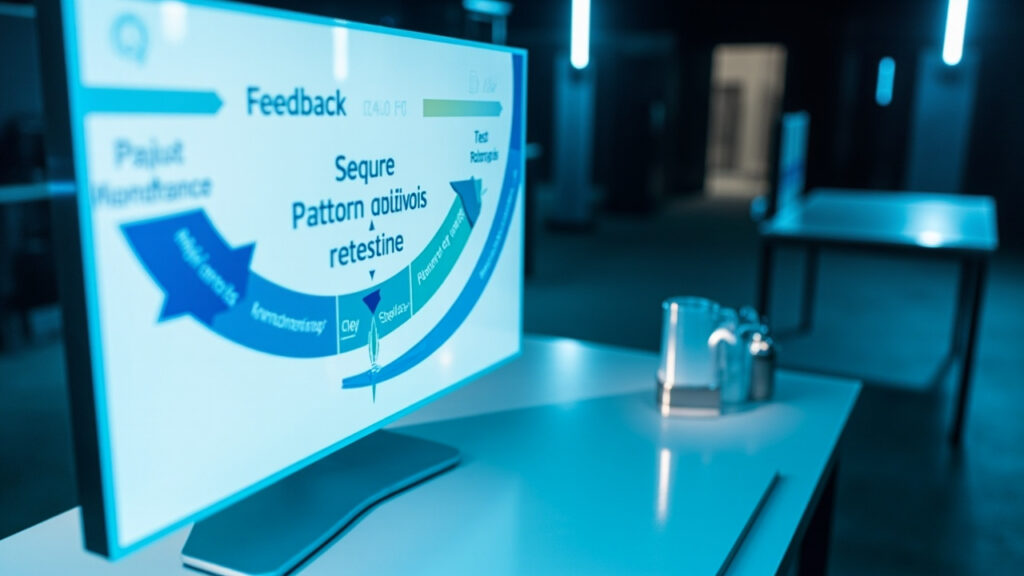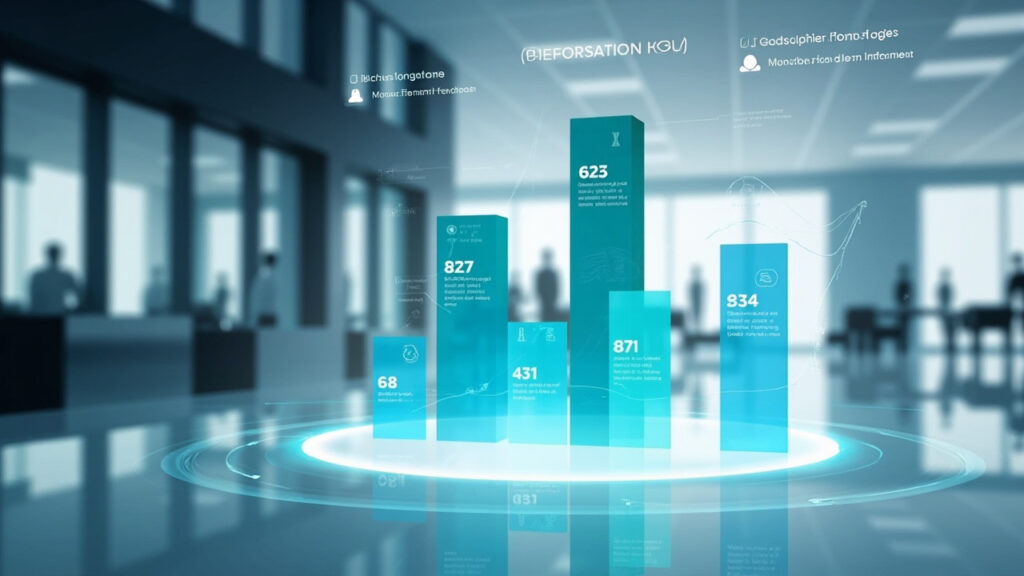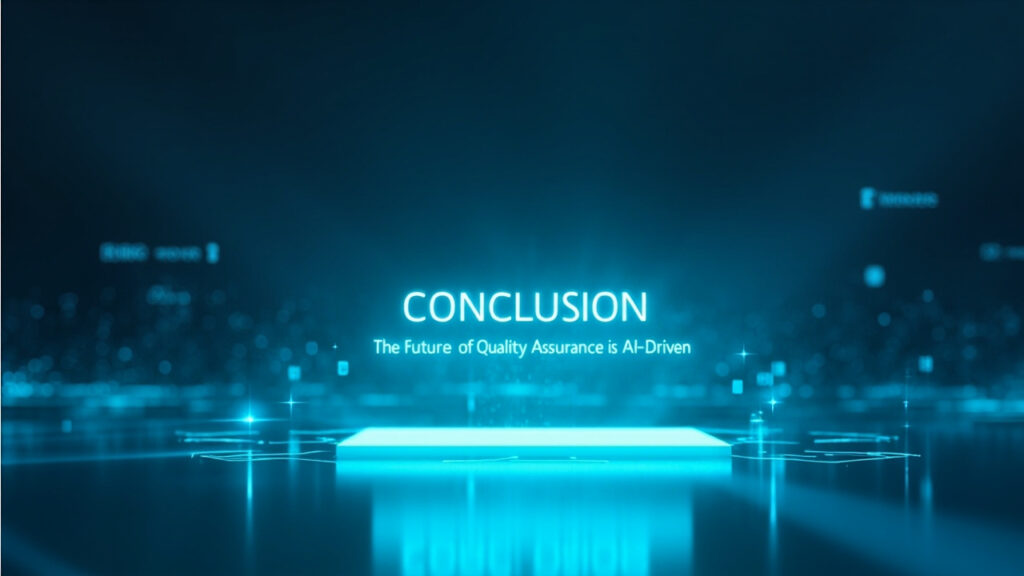In the rapidly evolving tech industry, the pressure to release high-quality software quickly and efficiently has never been more intense. Traditional quality assurance (QA) methodologies are struggling to keep pace with the complexities of modern software development cycles. This challenge is exacerbated by the increasing demand for mobile applications, cloud services, and robust data security, all of which add layers of complexity to software testing.
The introduction of Artificial Intelligence (AI) into the software quality assurance process has begun to transform the landscape, offering new ways to enhance efficiency and accuracy. This blog post will explore how AI is being integrated into QA processes, highlight the challenges faced by traditional methods, and explain how innovative solutions like GenQE are setting new standards for what businesses can achieve with their QA strategies.
By understanding these advancements, you’ll gain insight into how your organization can leverage AI for better outcomes, reduce costs, and speed up time to market without compromising on quality.
The Challenges of Traditional Software Quality Assurance

Traditional approaches to software testing often involve manual processes that are time-consuming and prone to errors. As software becomes more complex, these methods have shown their limitations more clearly.
Manual Testing and Its Limitations
Manual testing requires significant manpower and is inherently slow and labor-intensive. Testers must meticulously check all aspects of an application to ensure functionality, which becomes impractical as applications scale and update frequently. The risk of human error increases under pressure, leading to potential oversights that can cause significant issues post-release.
Automation in Testing: The First Step Forward
Automation helped address some of the speed and resource challenges by replicating predefined actions to check for expected outcomes. However, automated tests can be brittle and often fail when there are minor changes in the application’s UI or in the test environment. Such scripts require frequent updates, which can negate the time savings and reduce the overall efficiency of the testing process.
The Need for Scalability and Adaptability
As enterprises grow, their software solutions need to scale accordingly. Traditional testing methods do not scale well or adapt quickly to changes, leading to bottlenecks and delays in deployment. This lack of flexibility can hinder a company’s ability to innovate and respond to market demands.
AI in Quality Assurance: A Game Changer

The integration of AI into software quality assurance is proving to be a revolutionary step, fundamentally changing how testing is conducted.
Enhancing Test Automation with AI
AI enhances test automation by enabling dynamic test creation, execution, and analysis. This not only reduces the need for manual intervention but also makes the tests more resilient to changes in the application. AI-driven systems can identify and adjust to changes automatically, maintaining the relevance and effectiveness of test scenarios without constant human oversight.
Predictive Analytics and Machine Learning
AI algorithms can predict potential defects and areas of risk by analyzing historical data and user interactions. This proactive approach allows QA teams to focus their testing efforts more effectively and prevent issues before they arise. By understanding patterns and predicting outcomes, AI transforms reactive testing into a proactive quality assurance process.
Continuous Learning and Integration
AI systems continuously learn from new data, allowing them to improve their testing strategies over time. This continuous learning capability aligns well with agile development practices, where incremental changes are made and tested regularly. AI-driven testing can adapt quickly to these changes, providing ongoing support without the lag associated with traditional methods.
GenQE: Pioneering AI-Driven Quality Engineering

GenQE offers a suite of AI-driven tools designed to optimize QA processes, addressing many of the challenges mentioned above.
AI-Driven Test Generation
GenQE automates the process of test case creation, enhancing the coverage and effectiveness of tests. This automation not only speeds up the testing process but also ensures a higher level of accuracy and consistency in test scenarios. By analyzing software requirements and user behavior, GenQE can create comprehensive, effective test cases without manual input.
Smart Test Execution
GenQE intelligently prioritizes and executes test cases based on risk analysis and potential impact. This ensures that critical issues are identified and addressed promptly, optimizing the efforts of QA teams. This targeted approach reduces wasted effort and focuses resources on areas that have the highest potential for defects.
Self-Healing Automation
One of the standout features of GenQE is its self-healing capabilities, which automatically adjust test scripts when changes are detected. This significantly reduces maintenance time and effort, ensuring that automated tests continue to run effectively even as the application evolves.
Integrating GenQE with DevOps and CI/CD

GenQE’s integration within DevOps and Continuous Integration/Continuous Deployment (CI/CD) pipelines exemplifies the seamless incorporation of AI into existing workflows.
Streamlined Operations
GenQE’s compatibility with popular tools like Jenkins, GitHub Actions, and Selenium facilitates a smoother integration into the software development lifecycle. This compatibility enhances both speed and efficiency, enabling a more fluid transition from development to deployment.
Enhancing Developer Productivity
By automating repetitive testing tasks, developers can focus more on creative problem-solving and innovation. This not only improves productivity but also enhances job satisfaction, as developers can engage more with the creative aspects of software development instead of being bogged down by repetitive testing tasks.
Case Studies and Success Stories

Examining real-world applications of AI in QA, particularly through GenQE, provides valuable insights into its practical benefits and effectiveness.
Example: E-commerce Platform Optimization
An e-commerce company implemented GenQE to handle their complex, frequently updated product platform. The introduction of AI-driven testing resulted in a 50% reduction in testing time and a significant decrease in post-deployment issues, enhancing customer satisfaction and reducing costs associated with bug fixes and customer support.
Example: Financial Services Security Enhancement
A financial services provider used AI-driven testing to enhance the security and reliability of their applications. This proactive approach to identifying potential security flaws before deployment was crucial in maintaining trust and compliance, especially in an industry where security is paramount.
Conclusion: The Future of Quality Assurance is AI-Driven

The integration of AI into quality assurance is not just an enhancement but a necessary evolution to meet the demands of modern software development. Tools like GenQE are at the forefront of this change, offering solutions that transform potential challenges into opportunities for growth and improvement.
As we look to the future, the role of AI in QA will only grow, becoming more integrated and indispensable. For organizations looking to stay competitive, exploring AI-driven QA tools like GenQE is not just an option—it’s an imperative.
Explore how GenQE can revolutionize your QA strategy and help you achieve new levels of efficiency and effectiveness in your software development cycle.
Discover More Innovative Solutions
Want to learn more about the tools and technologies discussed in this article? Explore how these innovations can be tailored to your specific needs and workflow requirements.
Our team of experts is available to answer your questions and provide personalized insights into how modern solutions like GenQE can address your specific challenges.